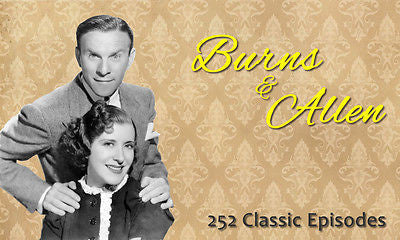
Burns and Allen Show
Regular price
$5.00
Sale
FORMAT: (1) MP3 DVD / (3) MP3 CDs
In 1929 they made their first radio appearance in London on the BBC. Back in America, they failed at a 1930 NBC audition. After a solo appearance by Gracie on Eddie Cantor's radio show, they were heard together on Rudy Vallee's The Fleischmann's Yeast Hour and on February 15, 1932 they became regulars on The Guy Lombardo Show on CBS. When Lombardo switched to NBC, Burns and Allen took over his CBS spot with The Adventures of Gracie beginning September 19, 1934.
Along the way, the duo launched the temporary running gag that made them near-irrevocable radio stars: the famous hunt for Gracie's "lost brother," which began on January 4, 1933 and eventually became a cross-network phenomenon. Gracie was also liable to turn up on other shows (especially those produced by the J. Walter Thompson advertising agency, which produced the Burns & Allen series) looking for her brother. Bad publicity after a bid by NBC to squelch the stunt---and an accidental mention by Rudy Vallee on his Fleischmann's Hour---helped the stunt continue, according to radio historian John Dunning's On the Air: The Encyclopedia of Old-Time Radio, which also mentioned that Gracie's real brother, a "publicity-shy accountant" living in San Francisco, went into hiding until the gag ran its course.
Burns and Allen followed this up with another stunt: "Gracie Allen for President." During the election year of 1940, Gracie represented the fictitious Surprise Party and advocated nonsense as part of her platform. The "campaign" was successful enough for Gracie to actually receive write-in votes on election day.
The title of their top-rated show changed to The Burns and Allen Show on September 26, 1936. One successful episode, Grandpa's 92nd Birthday, aired on 8 July 1940. In 1941 they moved from comedy patter into a successful sitcom format, continuing with shows on NBC and CBS until May 17, 1950. As in the early days of radio, the sponsor's name became the show title, such as Maxwell House Coffee Time (1945–49). Burns and Allen had several regulars on radio, including Toby Reed, Gale Gordon, Bea Benaderet, Gracie's real-life friend Mary "Bubbles" Kelly, Ray Noble, singers Jimmy Cash and Tony Martin and actor/writer/director Elliott Lewis. The Sportsmen Quartet (appearing as "The Swantet" during the years the show was sponsored by Swan Soap) supplied songs and occasionally backed up Cash. Meredith Willson, Artie Shaw and announcers Bill Goodwin and Harry Von Zell, who were usually made a part of the evening's doings, often as additional comic foils for the duo.
For a long time they continued their "flirtation act" with Burns as Allen's most persistent suitor. Their real-life marriage was not written into the show until 1941, when Burns noticed that their ratings were slowly but steadily slipping. He realized that he and Gracie "were too old for our jokes", and revised the format to include husband-and-wife characters in a situation-comedy setting. Burns's assessment was correct, and the Burns and Allen program went on to new
